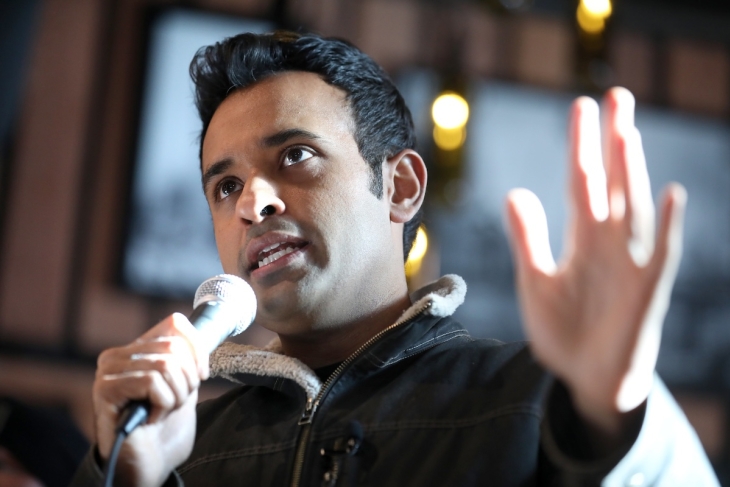I’m no “tech bro,” nor a fan of Ramaswamy (or Musk), but Vivek was right this time:
Our American culture has venerated mediocrity over excellence for way too long (at least since the 90s and likely longer). That doesn’t start in college, it starts YOUNG. A culture that celebrates the prom queen over the math olympiad champ, or the jock over the valedictorian, will not produce the best engineers…. This can be our Sputnik moment. We’ve awaken [sic] from slumber before & we can do it again…but only if our culture fully wakes up. A culture that once again prioritizes achievement over normalcy; excellence over mediocrity; nerdiness over conformity; hard work over laziness.
As everyone knows, this (excerpted) tweet helped trigger the dust-up over H-1B visas, the kind that the U.S. bestows on specialized and highly skilled workers from other lands so they can take jobs here that employers otherwise find hard (or impossible) to fill. They’re a very big deal in Silicon Valley and through the tech world, as is obvious when you see how many key figures in that realm—Musk included, as are Ramaswamy’s parents—came from elsewhere.
As everyone also knows, this comment (accompanied by Musk’s feisty defense of these visas) triggered an avalanche of criticism from anti-immigrant Trumpsters, Steve Bannon included.
After much shouting and puzzlement as to whether Trump would side with his DOGE team or his traditional base, the President-elect weighed in on the pro-visa side, declaring to interviewers that “I've always felt we have to have the most competent people in our country. We need competent people, we need smart people coming in to our country.”
Almost all the attention being ladled onto this issue involves politics and whether it was smart of high-profile Trump advisors (and funders) to say things that would alienate many of his actual voters. But that’s not the part that caught my eye
What grabbed me was the accuracy of Ramaswamy’s diagnosis of why America’s own education system—enmeshed as it is in the broader culture—isn’t producing enough highly educated, hard-working, smart people to fill the jobs that our own ingenuity and entrepreneurialism are creating.
Everyone knows—or should know by now—that it’s not, and you don’t need Ramaswamy (or Musk or Trump) to supply the evidence. Look at the recent TIMSS data for eighth graders in math and science. Look at decades of PISA data. Look at the new OECD report on adult skills. Over and over we see not just that the United States trails many other countries in average achievement, but also that much smaller percentages of Americans make it into the ranks of high achievers on these international comparisons.
Yes, yes, we have most of the world’s top universities. Yes, our very strongest graduates of our schools and colleges are solid, as good as anybody’s. But there aren’t nearly enough of them, not nearly enough for our own domestic manpower needs. The achievement pyramid is way too steep and narrow at the top.
The formal education system is not entirely culpable here, for Ramaswamy’s right when he states that the culture bear much responsibility for what it does and doesn’t value and prioritize. But the implications for K–12 and higher education are profound, and many educators have come to share the anti-achievement bias of the broader culture. Thus the neglect-verging-on-hostility to acceleration and advanced learning (a.k.a. “gifted and talented” education, exam schools, etc.), despite mounting evidence—including an important new study—that such opportunities propel many more students, including disadvantaged youngsters, into the ranks of high achievers.
We tend to explain that resistance by saying equity comes first, advanced programs are discriminatory, and we must concentrate our energy on low achievers. But that’s not the whole story.
See, for example, an astute New York Times column (published on Boxing Day) by Wharton psychologist Adam Grant, titled “No, you don’t get an A for effort.” He wrote of U.S. education that:
...we’ve taken the practice of celebrating industriousness too far. We’ve gone from commending effort to treating it as an end in itself. We’ve taught a generation of kids that their worth is defined primarily by their work ethic. We’ve failed to remind them that working hard doesn’t guarantee doing a good job (let alone being a good person). And that does students a disservice.
I somehow doubt that Professor Grant and Vivek Ramaswamy have much in common. But combine the former’s observation that schools honor work over achievement with the latter’s observation that our culture “celebrates the jock over the valedictorian,” and you will have plenty to ponder as we enter the New Year. Maybe even the makings of an important resolution—one we might even hope is shared by the incoming administration.




